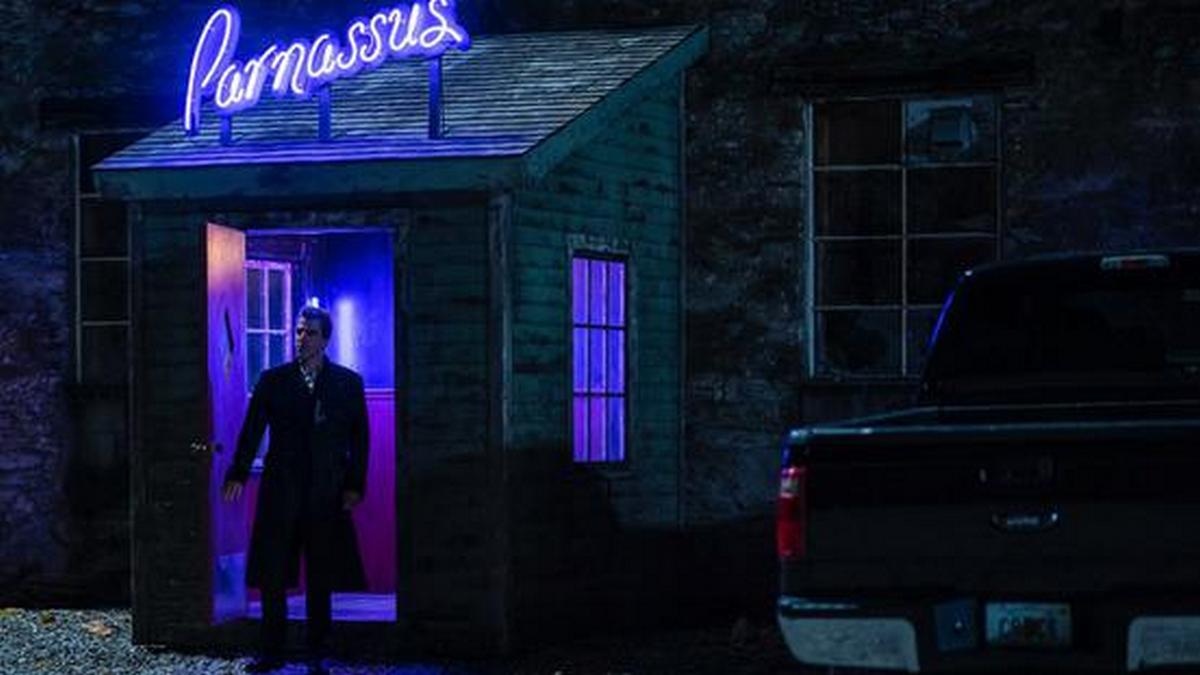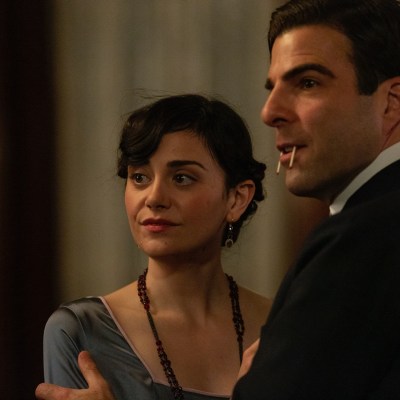This NOS4A2 review contains spoilers.
NOS4A2 Season 2 Episode 3
One thing that NOS4A2 did between seasons is tinker with its special effects. For whatever reason, Charlie Manx as an old man looks a little better than he did the previous season (and the exaggerated widow’s peak he had when he was young Charlie has been eliminated, too).
All across the board, it seems, the special effects seem to be coming across the screen better, from the blood and guts of previous episodes to things like the scarred-up ghost living in the Manx house on the outskirts of the Manx inscape, just outside the gates of Christmasland.
However, one effect that doesn’t hold up when seen frequently is the razor-sharp teeth of the children keeping Millie company and eating whatever drifters Charlie brings home. When they just show up, it looks fine. A child flashes a creepy, fanged smile while sitting in the back seat of the Wraith? Perfect. Millie Manx tries to emote with a mouth full of digitally enhanced dentures? Not so much.
This isn’t a knock against Mattie Conforti, who does a fine job with the material she’s given (particularly Millie’s anger and malevolence), but more a criticism of the idea behind the teeth. They tend to be very distracting, at least to me, and dull the impact of Millie discovering that her mother, who also died by Charlie’s hand in the back of the Wraith, is trapped in Christmasland, just like the rest of them, in her own private hell.
As Millie deals with a secret that her father’s keeping, one of many no doubt, Vic and her father deal with the fall-out of his later-in-life turn away from the bottle and necessity to keep a sober house. The relationship between Vic and Chris McQueen remains one of the show’s better pairings; the two have a pretty natural chemistry akin to that of a parent and a child, and while Chris might not have been much of a husband, it’s clear he was a good father to Vic, which is why she ran to him in the first place.
Their discussion over coffee the next morning, when he explains to Vic he threw out her mini-bar bottles of pocket liquor, carries a lot of weight and it’s clear that Chris isn’t drawing this line for Vic, he’s drawing it to protect himself, and all the hard work he’s done since becoming sober since the first season.
In Lucy Thurber’s script, the father-daughter relationships take precedent over anything else. Vic and Chris McQueen have always been one of the strongest relationships on the show, and in Thurber’s hands, that remains true. Millie and Charlie Manx have a relationship that has been less explored, but is no less interesting. What started as a father-daughter fantasy land now seems to be something of a prison to keep the daughter close, and stands as a testament not to Charlie’s love for Millie, but Charlie’s regression from reality.
He keeps getting children, ostensibly because he wants Millie to have company, but it’s really more about keeping Charlie alive at this point. Every new playmate in Christmasland is simply another person Millie is responsible for while Charlie is off in the real world, or hanging out at the bar on The Night Road with special guest Snake (a very exciting Tom Savini cameo) among the usual suspects.
Read more
Charlie and Vic find their relationship strained by alcohol abuse on both sides—the two never quite match up enough to be drinking buddies, except for that one or two beers in the first season—while the Manx family relationship is strained by, essentially, Charlie’s selfishness and thirst for revenge.
Craig William Macneill does a solid job of showing that the two, Charlie and Vic, are sides of the same coin. One wants revenge, and is risking everything to get it. One wants to keep her family safe and stop a killer, but in the process is putting her family in grave danger and alienating the very people she’s most concerned about.
Everyone but Charlie seems to know that his revenge cycle will likely end up with him dead. Abe (Reg Rogers) says as much when he tries to talk Charlie out of getting in touch with The Hourglass. Abe owes Charlie his life, and Snake might be willing to gamble with him, but nobody seems to like Charlie all that much. Even among his fellow dark souls, Charlie isn’t particularly liked or popular, and after Millie discovers just who is staying in that house on the hill, Charlie won’t be very popular at home, either.
However, improved makeup and special effects won’t cover some of the holes marring “The Night Road.” Turning the hero of the thing from a likable, plucky, creative teenager into a hopeless, meandering drunk who keeps burning bridges with her family won’t help. Ashley Cummings is great in the role, but Vic, aside from her moments of heroism when she tries, and fails, to take out The Wraith, is a character adrift.
Without Manx, she’s got nothing. With Manx, she’s still got nothing, because all Manx has done is guide her to take risks with her life and alienate her friends and loved ones. Charlie wants to live, to keep Christmasland and his daughter alive; Vic wants to stop Charlie, and doesn’t seem to care if she goes off and dies being a hero. Sacrificing yourself for something is all well and good, but Vic’s crusade sees her abandoning anyone who might be able to help her, from Lou to Tabitha (and all her assorted FBI contacts).
Both characters have goals that will end up alienating everyone they claim to be protecting, because, at their core, both of them are a little selfish. Vic has to be a hero, Charlie has to stay young and vital. They have other reasons, and good reasons, to act in the ways that they do, but there’s more to it than surface altruism.
It’s fine character work, but that doesn’t make it particularly satisfying television. It’s more slow than methodical, more wheel-spinning than emotionally wrought. There’s something building on both fronts, but “The Night Road” is in no particular hurry to get there, to its detriment.


